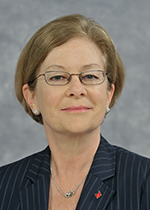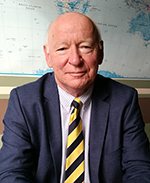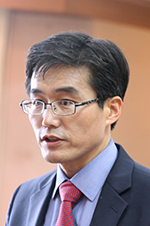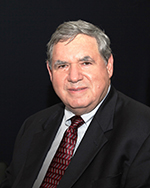Governance Around the Globe in an Era of Populism
Saturday, March 18 | 12:30 p.m. - 2:00 p.m.
 Moderator: Meredith Newman, Florida International University
Moderator: Meredith Newman, Florida International University
Meredith A. Newman is Vice Provost for Faculty and Global Affairs at Florida International University. In this role she works directly with the Provost to oversee all initiatives that support faculty, including recruitment, promotion and retention of faculty and other areas that relate to a professionalized faculty and career progression. Newman also oversees FIU Global, which centralizes the university’s global initiatives in regards to planning, facilitating, coordinating and initiating partnerships with international institutions and organizations. She serves as Chair of an FIU Global Council, made up of multidisciplinary representatives, whose mission includes facilitating the expansion of global learning programs and strategic global initiatives for FIU. Newman joined the faculty as Director of the School of Public Administration and Professor in Public Administration in 2006. She subsequently served as Chair of the Department of Public Administration before joining the Dean’s office at the College of Arts & Sciences in January 2013 as Senior Associate Dean and subsequently as Vice Dean. Her successful academic career includes appointments at the University of Illinois Springfield and at Washington State University Vancouver. Prior to her career in academia, Newman served with the Australian Foreign Service, the U.S. Department of State, and the World Bank, including tours of duty in France, Viet Nam, Senegal, Malaysia, and Republic of Singapore. Newman is recognized as one of the leading experts in the field of public management and the emotive aspects of work. Newman’s books have won numerous awards. Her contributions to the profession have been recognized by a series of awards, such as the Lifetime Achievement in Public Human Resources Scholarship Award of the American Society for Public Administration. Newman is past Chair of the Commission on Peer Review and Accreditation of the Network of Schools of Public Policy, Affairs and Administration; and Past President of the American Society for Public Administration. She is Vice President for Regional and International Cooperation, the International Association of Schools and Institutes of Administration; and a Fellow of the National Academy of Public Administration.
Panelists:
 Kaye Husbands Fealing
Kaye Husbands Fealing (Georgia Tech)
Kaye Husbands Fealing is an economist who comes to the Ivan Allen College of Liberal Arts from the Hubert H. Humphrey School of Public Affairs at the University of Minnesota. During the course of her career, she has built a distinguished record of achievements in scholarship and education, as well as in national and international leadership and service. Her areas of expertise include international trade policy; science, technology, and innovation policy in specific contexts; knowledge generation and the development of networks. Husbands Fealing developed models to measure science innovation and to measure the impacts of market forces and policy on the access of women and minorities to employment and careers in science, technology, engineering, and mathematics (STEM) areas. She has held named professorships at two institutions and served as president of the National Economic Association. She developed the National Science Foundation's (NSF) Science of Science and Innovation Policy program and co-chaired the Science of Science Policy Interagency Task Group. At NSF, she also served as an economics program director. She was a visiting scholar at Massachusetts Institute of Technology's Center for Technology Policy and Industrial Development, where she conducted research on NAFTA's impact on the Mexican and Canadian automotive industries and research on strategic alliances between aircraft contractors and their subcontractors.
 Rolet Loretan
Rolet Loretan (International Institute of Administrative Sciences)
Mr. Rolet Loretan was born in 1952 and is a Swiss citizen. Trained as a lawyer at the University of Freiburg (Switzerland), he is also a graduate of the Swiss Graduate Institute of Public Administration (IDHEAP), University of Lausanne. He started his professional career within the Swiss Federal Government in Berne. He began as a legal expert in the Central Office of General Defence. In 1987 he became Head of the Army Affairs Section and later Deputy Head of the Military Policy Division within the General Secretariat of the Swiss Ministry of Defence. In 1996 and for 10 years after he was appointed Head of the Press and Radio Division (DIPRA), Headquarters of the Federal Council (Swiss Government), in charge of information related to extraordinary situations. In 2006, he became 1st Rapporteur for Strategic Planning and Actions at Headquarters for the Swiss Federal Council Delegation for Security when called upon to take up the management of IIAS in Brussels. Loretan has also carried out a parallel career as an officer in the Swiss Army where he has the grade of Colonel within both the Mountain Infantry and the Swiss Military Court of Appeals where he served for 24 years as Senior Judge. Before IIAS, he was involved at the international level since 1992 within the International Society for Military Law and the Law of War, an NGO whose seat is in Brussels, where he is Honorary Vice-President. Loretan officially took up his duties as Director General of IIAS on Nov. 1, 2006.
 Jae Moon
Jae Moon (Yonsei University)
Professor Moon is Underwood Distinguished Professor of the Department of Public Administration of Yonsei University. He currently serves as the International Director of ASPA as well as Vice President of the Korean Association of Public Administration. His research interests include public management, information technology/environmental policy and comparative public administration. He was Editor-in-Chief for the
International Review of Public Administration and Book Review Editor for
Public Administration Review. He is the recipient of Mosher Award for the best article in
Public Administration Review as well as the Peter Boorsma Award in 2009. He has been a Fellow of National Academy of Public Administration (NAPA) since 2012.
 Allan Rosenbaum
Allan Rosenbaum (Florida International University)
Allan Rosenbaum was the 2014-2015 President of the American Society for Public Administration. He has served as Director of the Institute for Public Management and Community Service and Professor of Public Administration at Florida International University (FIU) in Miami, Fla. The Institute is FIU’s principal vehicle for working internationally in the areas of governance reform, decentralization, legislative development, strengthening local government and democratic institution-building. Rosenbaum served for six years as Dean of the School of Public Affairs and Services at FIU. Prior to that time, he was Associate Professor of Policy Sciences at the University of Maryland, Baltimore Graduate School, where he directed the Maryland Institute for Policy Analysis and Research, a state government-oriented public policy research institute. He served in the U.S. federal government dealing with executive branch-congressional relationships in the area of educational policy during on the faculty at the Universities of Connecticut and Wisconsin, Madison and held a research position at the University of Chicago. He has also worked in state government in Illinois as Assistant to the Senate Minority Leader and, subsequently, as Administrative Assistant to the Lieutenant Governor, and, for one year, served as acting budget administrator of the City of Miami, Florida. Rosenbaum has been heavily engaged in international public administration and democratic development technical assistance, consulting and research. He has written on governance reform, decentralization issues and legislative relations in various countries, including Bolivia, Chile, Paraguay, Sierra Leone and Ukraine. He has consulted, worked or spoken in more than 80 countries around the world. He has authored, co-authored or co-edited a number of publications for the United Nations, as well as prepared papers on issues of decentralization, democracy and civil society for major United Nations Conferences in Bucharest, Marrakech, New York, Windhoek and Rio de Janeiro. Rosenbaum served as President of the International Association of Schools and Institutes of Administration (IASIA) from 2001-04 and 2007-10, and on the Executive Committee of the International Institute of Administrative Sciences (IIAS). He received a B.A. in History from the University of Miami and a Master’s Degree in Higher Education Administration from Southern Illinois University, as well as a Master’s Degree in Political Science and Public Administration from the University of California, Berkeley. He received his Ph.D. in Political Science from the University of Chicago in 1976.
 Anastase Shyaka
Anastase Shyaka (Rwanda Governance Board)
Professor Anastase Shyaka is the CEO of Rwanda Governance Board (RGB) since 2011. Prior to this, he was the executive secretary of the Rwanda Governance Advisory Council (2008-2011). As part of his advisory role, he created the Rwanda Governance Scorecard, an index to accurately gauge the country’s governance and development status. Before joining the government, he was a professor of political science and the director of the Center for Conflict Management (CCM) at the National University of Rwanda. While at the university, he initiated two ongoing Masters programs: MA, Peace and Conflict Transformation, and MA, Genocide Prevention Studies. Shyaka is a former Fulbright Scholar in Residence (2007) at George Mason University and Northern Virginia Community College, where he taught Social and Political Change in Contemporary Sub Saharan Africa). He has authored, co-authored and co-edited a number of publications pertaining to governance, democracy, conflict and peace building, African politics and regional studies. Shyaka has participated in a number of national and regional development processes in the Africa’s Great Lakes Region. From 2010 to 2012, he has been appointed by East African Community’s Heads of States to the regional Team of Experts to conduct a prospective study of the East African Political Federation. Between 2004 and 2005 he was also a member of the Peace and Security Technical Task Force for the United Nations African Union-led International Conference on the peace process in the 11 Africa’s Great Lakes nations. He currently serves on various governing boards of trustees for national and international organizations. He is a member of the board of the UN Global Center for Public Service Excellence (GCPSE) based in Singapore. He is also a member of the Global Academic Advisory Board of World Learning, a U.S. based organization working in more than 100 countries; and Chairman of the governing board of the University of Technology and Arts of Byumba (UTAB), Rwanda. He is a member of the
Public Administration Review editorial board. Shyaka received his Ph.D. in political science from the University of Gdansk (Poland) in 2001.